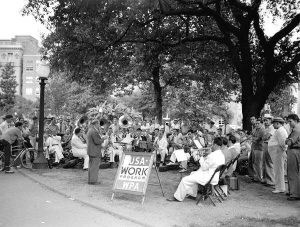A fortnight ago, Boris Johnson compared himself to US President Franklin Delano Roosevelt. FDR’s New Deal turned round the economic collapse of the Great Depression. He created the first ever US state pensions and unemployment insurance. He promoted collective bargaining, improving wages and working conditions. The Public Works Administration built dams, bridges, schools and hospitals.

Last Wednesday, Chancellor Rishi Sunak launched a flagship scheme to give us up to a tenner off a meal out. But only from Monday to Wednesday. Throughout August. Participating restaurants only. (Terms and conditions apply.)
Less of a New Deal, more of a Meal Deal.
A package of “up to” £30 billion should have given confidence. It hasn’t. In the past few days I’ve spoken to businesses, investment firms, journalists and economists. Underwhelmed doesn’t cover it.
First and foremost, “economic activity” will only recover once people feel safe. We need a working test system.
New Zealand implemented strict lockdowns and a rapid test, trace and isolate system. Since May, they’ve been bobbing along at between 0 and 2 new cases per day. Weeks ago, they removed restrictions and returned to normal. Total death count, 22.
In the UK we had herd immunity. Then no herd immunity. The PM’s senior advisor driving across the country while he knew he was infected. VE day street parties with conga lines. The official government decision to suspend the contact tracing system way back in March. Then a half-baked scheme for a national app. Then another U-turn. Then a world-class system in place at the start of June. That isn’t yet operational, despite it now being the middle of July. Total death count, 45,000.
Look after your people, and the economy will look after itself. It’s the first duty of any government.
Now, the OECD is warning that UK unemployment will hit 4 million this year. There was nothing in Wednesday’s announcement for High Streets. Yet last week, we’ve seen Boots and John Lewis announce 5000 job losses. Nothing for manufacturing, despite 12,000 job cuts in aviation.
North East councils face a £272 million black hole in their budgets. It’s the same across the country.
In May, government said “do what you need to tackle the crisis. We’ll pay for any costs.”
Government is now refusing to honour that promise. Unless they do, there’ll be emergency budgets, services cut, and thousands more job losses.
Replacing permanent jobs with six-month Kickstart schemes is bad economics.
What should the Chancellor have done?
First, target spending into the productive economy. Wednesday’s announcement showed no awareness of what our regional economies need.
We submitted a plan for £100 million investment in the offshore and renewables industry.
The Chancellor could have said, “We’ve left the EU. We’ll require that all offshore wind in UK waters must have 50% British content.”
We have a whole industry along the Tyne and in the North East that can supply it. The industry would scramble to invest here. It would create thousands of high quality jobs. It would cement the North East as a world-leader in renewable energy. It would pave the way for a Just Transition from fossil fuels into clean energy. It would pay for itself.
Cutting Stamp Duty is a wasteful way of encouraging house building. Seven out of eight house buyers are moving in a chain. Only one in eight moves to a new build.
There are nine Metro Mayors.
The Chancellor could have said, “Here’s £500 million each. Build 5000 affordable, eco-homes. You can sell them on, rent them as council houses, either way, it pays for itself.”
It would tackle the housing crisis, homelessness, climate change and create skilled jobs.
Newcastle has nearly 60,000 students. Overseas students, especially from the Far East, won’t be coming here until we get Covid-19 under control.
The Chancellor could have said, “I’ll fund all university tuition fees for all UK students who start this September or next.”
It would fund our universities by getting them to do what they’re there for. And skill up our workforce with high quality education.
We needed a Green New Deal. Instead, we got a Meal Deal.
Published originally in the Journal and Evening Chronicle 13.7.20

